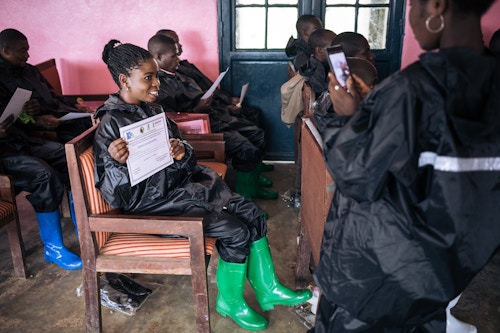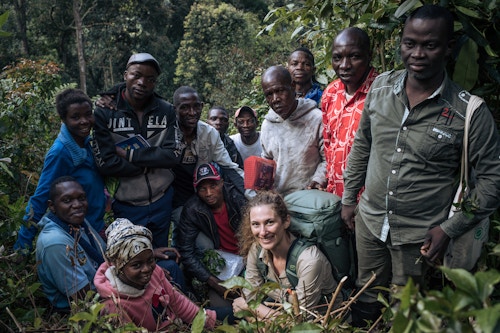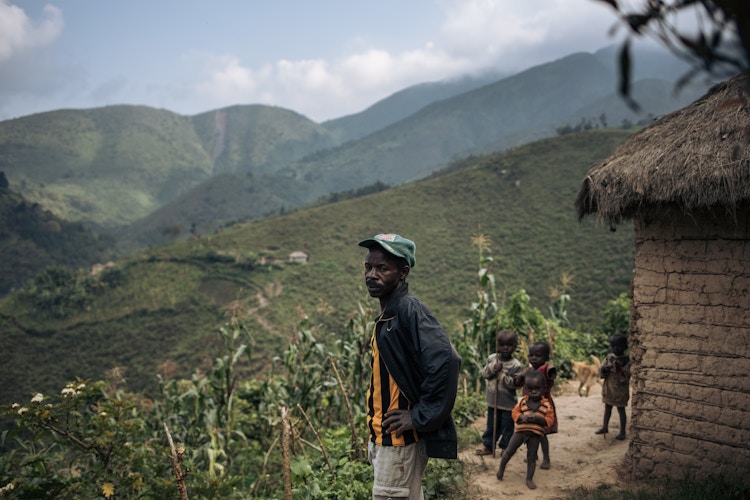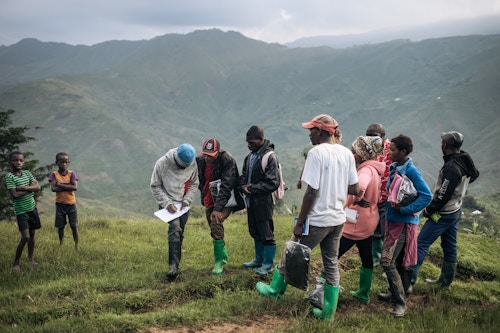The challenges of community-based forest conservation in a Congolese hotspot
The Itombwe Nature Reserve, in the Democratic Republic of Congo, could set a standard for participatory forest conservation in Central Africa.

By: Marine Gauthier*
In the eastern part of the Democratic Republic of Congo lies the Itombwe Massif, where Mount Mohi, a sacred mountain according to local customs, peaks at 3,475 meters. Known as one of the most biodiverse massifs of Africa, covering more than 7 000 km2, Itombwe is home to approximately 60 000 people, both indigenous Batwa peoples and other local communities. This rich mountainous area is very remote. Some of the valleys require up to 3 days by motorcycle followed by 10 days on foot to access, through steep slopes. It is threatened by the demand for both mineral and forest resources, the existing inter-community tensions, and by a myriad of armed groups which have been hiding and conducting military operations there since the second Congo War in 1998. Internally displaced people suffering from the Kivu conflicts are also present in the massif, adding to the instability and the pressure on natural resources, through both hunting and clearing of forests for agriculture.

Photo: Alexis Huguet/Rainforest Foundation Norway
“We are doing something unique here.”
Since 2008, Rainforest Foundation Norway and its partner organization Africapacity have been supporting communities’ effective participation in the development of a Nature Reserve. Together with local civil society, the Congolese Institute for Nature Conservation (Institut Congolais de la Conservation de la Nature, ICCN) and international conservation organizations such as WWF and WCS, have formed an alliance and committed to a new forest conservation approach. For the first time in the country, they all agreed to empower communities so that they themselves could protect the astonishing biodiversity present in the massif: elephants, gorillas, chimpanzees, pangolins… “We are doing something unique here”, says Germaine Buhendwa, Director of the Itombwe Nature Reserve and state representative in the Itombwe project. “We are trying to conserve biodiversity with the involvement of the communities rather than against them. But we now lack support.”
In 2016 an important milestone was reached: the limits of the reserve, as defined by local communities and Indigenous Peoples during years of discussions and participatory mapping activities, were legalized in a decree taken by the provincial government of South Kivu. This represented an unprecedented official recognition of the contribution of customary knowledge and practices in the protection of the forest. Itombwe could be the future of forest conservation in Central Africa, where the main approach of conservation hitherto has been to evict local populations from nature conservation areas, which has caused a multitude of human rights violations.







Setting up community patrols for joint management of the reserve
“The co-management of the reserve has been discussed for a long time, and the communities have for years expressed their will to engage at all stages and levels of management. Community patrols are one element of this strategy and a key demand from the communities. The communities of the Itombwe massif know their forests and its resources better than anyone else: they are the rightful actors to protect these forests”, says Jean de Dieu Wasso, Director of Africapacity. Being empowered to patrol the steep slopes of their mountains has been one of the communities’ conditions before engaging in the process. “We want our sons to patrol our forests”, said the women unanimously when consulted in 2016 on the management of the Reserve. In the Democratic Republic of Congo, eco-guards are paramilitary: they are armed and wearing military uniforms. “We don’t want to see them on our lands”, they said clearly. However, setting-up community patrols comes with its challenges: they would have no legal mandate against poachers, and could not be armed against the most dangerous ones. Moreover, community patrols would require funding: villagers need to be paid for their work, as they would use their time to patrol instead of taking care of their livelihood activities to feed their families.

In the absence of funds for the community patrols, ICCN has in dialogue with the communities and in agreement with traditional chiefs appointed 60 eco-guards to patrol the reserve. Photo: Alexis Huguet/Rainforest Foundation Norway
In the absence of funds for the community patrols, ICCN has in dialogue with the communities and in agreement with traditional chiefs appointed 60 eco-guards to patrol the reserve, with an office base in Mwenga, and two stations in Bingili-Bazala and Kalundu. The ICCN still has a somewhat top-down approach to conservation which sees the communities as people who lack information, rather than people who have the skills and the rights to make decisions about the management of resources. “We can transfer knowledge to the communities so that they respect our rules. We sensitize the hunters so that they don’t enter the integral conservation area and ensure that traditional chiefs actually sanction those who do not comply”, says Bernard, one of the ICCN trainers. This approach has been at the heart of a long-term conflict with local communities, linked to population displacements, violations of their human rights, and grave clashes with eco-guards, as some of the community activities become prohibited. Other tentative community-based approaches led by ICCN and conservation NGOs have been limited to compensation strategies, offering micro-credits or livelihood alternatives with limited information on the actual consequences of letting communities’ lands be turned into a protected area. In various protected areas in the world, it ended up in severe backlash from the communities when they realized their lands had been taken from them.
Hiring community members and indigenous peoples as formal eco-guards, as it has been tried in other protected areas, is not a promising option. Instead of empowering local communities, it divides them, asking some members to follow the state’s rules and arming them against their own community. “It would be key for community patrols to remain agents of the community, not of the state.”, confirms Jean de Dieu. In 2019, the UN Committee on the Elimination of Racial Discrimination for the first time made a recommendation in favor of applying the principle of Free, Prior Informed Consent, and of including Indigenous Peoples in the management of a protected area in Mongolia, to replace the policy of including only a few community members as eco-guards. This decision sets an example that could lead the way towards rights-based protected area management.


“We want our children to know the monkeys, too.”
Despite the different visions for the role of local communities, the partnership between ICCN and Africapacity has since 2018 materialized in joint trainings on patrolling. So far, community members from four villages have been trained, 20 from each village. Patrick Kongolo, Africapacity’s cartographer, trains them together with ICCN in the use of GPS and in biodiversity monitoring. He is a young agricultural engineer from Bukavu, the provincial capital of South Kivu and fascinated by the Itombwe mountains and by the local knowledge of their inhabitants. “We are complementary. I train them on technical monitoring, but they also teach us a lot on the forest. They showed us some animals they know, such as the Kichindi, a sort of local squirrel. They also taught us their customary way to signal the trails in the forest”.
The training we took part in started in the church of Burhinyi, one of the chiefdoms of Itombwe. The Mwami (the traditional chief) has nominated 18 men and 2 women known for their knowledge of the local forest, their strength and ability to walk on the steep slopes surrounding the village, and for being able to write and read, as the training is unfortunately not tailored for illiterate participants. For two days, the participants are taught the basics of conservation law, protected area management and bio-monitoring practices, including how to use a GPS. After two days of theory, the practice starts: equipped with GPS, boots and raincoats, carrying their food rations for 15 days, the whole team leaves for a practical training in the reserve. “After this training, they will all be able to do appropriate biomonitoring and to report on surveillance activities. They could actually do a large part of what the eco-guards do.”, says Patrick as he prepares to leave with them. For two weeks, the team will track wild animals, identify signs of Eastern gorillas, chimpanzees, locate the trails and the rivers, take coordinates with GPS and fill in forms to document the incredibly rich fauna and flora of the Itombwe massif.
The villagers of Mwenga, a neighboring chiefdom, were trained in 2018: “The training reminded us of what our ancestors used to do and of how to implement their rules. We want to protect the forest as our parents used to. We want our children to know they monkeys too. The forest is very important to us: we get our medicine, our food there. Most of us who have been trained are hunters: we know the trails, the animals, we know how to behave in the forest. We also don’t wear military uniforms and we are unarmed, so we would not scare the population. When poachers see us, we can discuss rather than fight. We could patrol even better than ICCN”, they share during a meeting in Burhinyi, talking about their experience as former trainees.
The Mujinji (guardian of customs) of Burhinyi, who assists the Mwami in his tasks as land chief confirms the role of the local communities in forest management: “We still have our traditional rules: For example, no one should enter the Malambo, the places where animals give birth and raise their progeny, nor hunt sacred animals such as the lion, the gorilla, the leopard, or the giant pangolin. When such issue arises, we refer to the Mwami who can apply traditional fines or customary curses. He is in contact with the sacred world and the spirits of the forest”. However, years of war and continuous efforts from the government to undermine indigenous customs have largely destroyed this social structure. The Mwami is now by law a state agent, reporting to and receiving a wage from the government. Many of them are getting their share out of the use and sale of natural resources, through taxes applied to artisanal loggers and miners. Empowering the communities to protect the forest themselves hence means questioning the whole structure of Congolese society and natural resources management, together with the state and the traditional authorities: it would mean tackling issues of redistribution of power, benefit-sharing and tenure rights of communities, which are highly sensitive.






Funding constraints – Training, but no patrolling
The villagers of Mwenga, who were trained two years ago, are disappointed: “We were trained in 2018, and have never patrolled since” they say. “We enjoyed the training, but what then? We thought our work would be to know the forest and to sensitize the community to protect it. We expected to be hired, to have a job after this training”. The training has raised a lot of hopes among the villagers of Burhinyi too: “During the training, we were told that gorillas can bring tourism and revenues”, says Chantal Shuku, one of the two women who were trained, “We are waiting for the tourists to come see our gorillas. Then our villages will be able to develop”. Unfortunately, the security situation and the local infrastructure do not allow for tourism to flow anytime soon in this beautiful massif of the Congo Basin. The Kivu war, ongoing for more than 20 years now, has fostered a myriad of armed groups hiding in the Itombwe forest and controlling parts of the protected area. Recent military operations of the Congolese army have resulted in new population displacements, tensions and incidents. Kidnappings by armed groups have increased in recent years. Still, the villagers hope that this training will lead to an improvement of their situation. “Could we be paid to patrol?”, they ask. “We would like to accompany visitors, to be guides for tourists”, they say.
“It is a ticking time bomb”, worries Germaine Buhendwa, the Director of the Itombwe Nature Reserve. “It is dangerous to train people and then not offer them opportunities to work. Ideally, we would like to train community patrols in the whole Reserve. But we don’t even have the means to patrol the reserve”. ICCN eco-guards amount to 60 men, in charge of the 5700km2 of the Reserve, and cannot access all parts of Itombwe due to security issues. “The budget allocated to the project suffered from the withdrawal of CARPE (a USAID-funded program), and now does not allow for the community to actually patrol the forests. Trained patrollers await being hired”, she deplores. Since the project has started, local trackers are sometimes hired by ICCN eco-guards to accompany their own patrols. Two or three men are hired for five to ten days to show them the way and help them in the forest. “This is not sufficient”, say the trainees. “We would like to be paid to patrol. We don’t trust ICCN and their eco-guards. Where ICCN knows there are gorillas, humans are asked to leave. We still fear that they will ask us to leave at a certain point. We want to be able to patrol on our own”.

Photo: Alexis Huguet/Rainforest Foundation Norway
Long term, strong commitment is needed to reach community-based rainforest protection.
Since 2016, the withdrawal of major financial partners has halted the progress of the Itombwe Nature Reserve towards full-scale community management. However, most of the initial partners are still present, such as WWF for instance which funds one of ICCN’s stations. "Despite a reduction in funding due to the closure of projects from major donors such as USAID and WWF Netherlands, we continue to be active in the Itombwe Nature Reserve and are exploring the possibility of continuing with other donors", says Gentil Kambale Kavusa, Project officer at WWF DRC.
“Paradoxically, the lack of funding of the traditional government-led conservation in the Itombwe Nature Reserve may have allowed more space for new approaches of community-based forest management”, observes Jean de Dieu, whose organization Africapacity has supported the communities’ engagement in the process since the beginning. “Because ICCN has lost a large part of their funds, they can’t afford not to work with communities as they do in other protected areas”. His hope is that ICCN, through this experimental training, will slowly change their approach even at the national level. “We are doing things differently here”, agrees Germaine. “The eco-guards bring poachers to traditional chiefs, not to prison. We try to discuss harmful practices instead of forbidding them. Artisanal mining is allowed in some parts of the reserve.” Indeed, these different rules for managing the Itombwe nature reserve have roots in the participatory mapping process and the subsequent zoning, where the communities defined a “multi-use” zone with authorized access and activities. This has been a positive outcome and allows the communities to preserve some of their income-generating activities.
Since the local economy and the survival of the community are based on the use of natural resources (charcoal production, mining, hunting), conservation projects most often stress the local inhabitants. “We have been asked to stop activities such as the use of traps in certain areas. We can agree to stop harmful practices, but we need alternative livelihoods. What are you going to do about that?”, says one of the trainees of Burhinyi during the training. Rather than using classical compensation strategies seen in other conservation projects, “Itombwe is different”, says Jean de Dieu in Africapacity. “Here, we want to empower people and respect their rights.”
This is the approach that Rainforest Foundation Norway seeks to support in the Congo Basin. Through long-term participation by local communities and strong commitment from both funding institutions and regulatory bodies, we hope to evolve rights-based sustainable forest management.
* Marine Gauthier is a rights-based forest governance consultant for Rainforest Foundation Norway and International consultant – Forest governance and community-based approaches.

